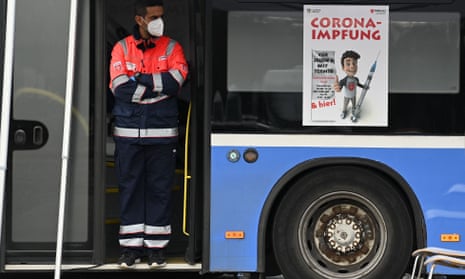Bavaria is to introduce sweeping measures to curb the spread of coronavirus, including cancelling all Christmas markets and placing limits on household mixing, its leader, Markus Söder, has announced.
Germany’s largest state by land mass, with more than 13 million inhabitants, has one of the lowest vaccination rates in Germany and one of the highest hospitalisation rates. “The situation is overwhelming and just keeps escalating,” Söder said.
The cancellation of Christmas markets, which were due to open next week, will be a crushing blow for the public as well as vendors, for the second year in a row. The markets are a highlight of the German calendar and are of huge economic and social importance, attracting significant numbers of visitors from home and abroad.
In other measures, the number of unvaccinated people who can meet in a private capacity will be reduced to a maximum of five people from two households, and nightlife venues will close. The rules are due to come into place next Wednesday and to last until 15 December.
Schools are to stay open, Söder said, and shops as well, although only one customer per 10 sq metres of shop space will be allowed. Hairdressers, driving schools and music schools will be restricted to those who can prove they are vaccinated (geimpft) or recovered (genesen) from Covid-19 – the so-called 2G rule. Restaurants, while operating on the same basis, will now have to close at 10pm.
At sporting and cultural events, the “2G+ rule” will apply, with people having to prove vaccination or recovery and produce a negative test certificate; Bavaria’s announcement noted that for 2G+ a rapid test is sufficient.
Söder said: “Above all the unvaccinated will be affected. It is a real risk to be unvaccinated.” He said the measures would be “massively controlled”.
Bavaria’s move came as neighbouring Austria announced it was to go into a nationwide lockdown from Monday and will introduce a national vaccine mandate in 2022.
Echoing the words of the Austrian chancellor, Alexander Schallenberg, Söder said: “I believe we will not be able to escape a vaccine mandate for everyone. Otherwise, we will get caught in a continuous loop.”
Earlier, Jens Spahn, the acting health minister, said he could not rule out a general lockdown across Germany, but added he was sceptical about a general vaccine mandate, “because I worry that it would tear this country apart”.
Bavaria’s decision followed a warning earlier in the day from Lothar Wieler, the head of Germany’s disease control agency, the Robert Koch Institute (RKI), who said the country was in a “state of national emergency”.
The RKI reported more than 52,000 new Covid cases on Friday, after 10 days in which the level of the virus continuously reached record levels not seen during the pandemic so far with daily deaths of between 200 and 300 for days. The national proportion of people who have been fully jabbed was just under 68% on Friday, well below the 90% experts say is needed to tackle the more virulent Delta variant.
A campaign to encourage booster shots has been virtually non-existent with just 4m having been administered so far.
Meanwhile, 14% of intensive care beds are occupied with coronavirus patients and increasing numbers of hospitals are having to move patients elsewhere.
Wieler recommended the cancellation of large-scale gatherings, the closure of what he called “hotspots” such as “badly ventilated clubs and bars” and the reduction of social contacts.
“We must put on the emergency brakes right now,” he said, comparing the virus to a “tanker heading towards a harbour wall, which if we all make an effort, might perhaps only ram the wall from the side, not smash into it full on”.
Christian Drosten, the head virologist at Berlin’s Charité hospital and an expert on coronaviruses, said the virus had yet to reach the “endemic phase” in Germany as it was soon expected to do in the UK.
In an interview in Die Zeit, he said: “You can see in the UK, which has round about the same vaccine level as us, and unfortunately twice as many deaths per head of population, that it is now in a ‘post-infestation’ stage, which has been ongoing since the late summer. Natural infections there are creating community protection. We’re not there yet in Germany, because there are too few people who have recovered [from the virus] and the elderly are not sufficiently vaccinated. If we let the virus spread uncontrollably it would lead to another 100,000 deaths if we don’t first close the vaccine gaps.”
